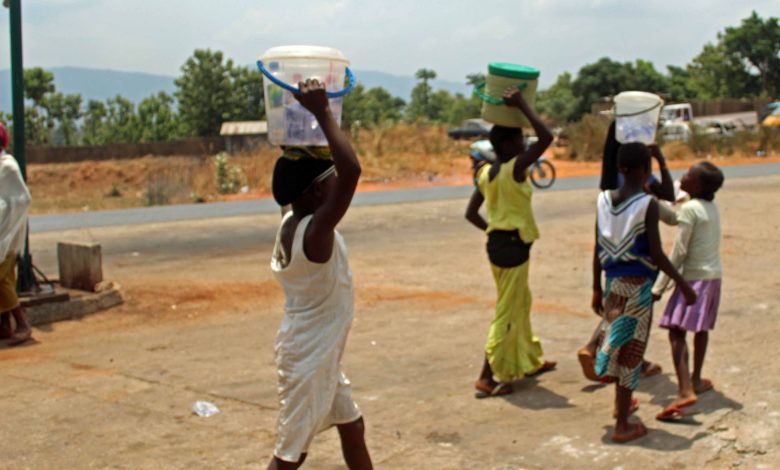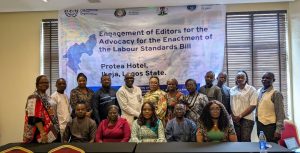
International Labour Organisation seeks media partnership to push through labour standard bill
The International Labour Organisation (ILO), Country Office for Nigeria, Ghana, Liberia, and Sierra Leone and Liaison Office For ECOWAS has called for renewed advocacy to push for the passing and enactment of the Labour Standard Bill in Nigeria.
Penpushing reports that the Director of the international body Dr Vanessa Phala made the call during interactive engagement session with senior media executives, labour union leaders and other stakeholders held in Lagos.
The Director emphasized the urgent need to mount advocacy for the enactment of the Labour Standards Bill that is now stuck at the Ministry of Justice, pointing out that Nigeria’s workforce has recorded some progress, however, lamented that the framework of labour laws has not kept pace with the evolving dynamics of Nigeria’s economy and workforce.

“For over five decades, Nigeria’s primary labour legislation, the Labour Act of 1971, has remained largely unchanged, aside from modest updates in 2004 and efforts in 2014. This dated Act does not fully account for the contemporary realities of the Nigerian workplace, particularly overlooking the informal sector, where a significant portion of the population is employed’, she said.
‘Much more is required to adequately secure the Fundamental Principles and Rights at Work for the Employers and workers. Gender equality, workplace safety, and protections for those in the informal economy all demand urgent legislative attention’, Phala added.
Penpushing further reports that she frowned at the current labour Act that has remained a deep-rooted challenge across many Nigerian communities, affecting millions of children who are compelled to abandon their childhood, education, and potential in favour of labour that often endangers their health and well-being.
The International Labour Organisation (ILO) boss explained that the focus of the engagement was to emphasise the necessity for a new Labour Standards Bill; review the status of the bill; secure media support for advocacy campaigns and establishment of a forum for ongoing evaluation and engagement.

Penpushing also reports that Phala, disclosed that the International Labour Organisation (ILO), through the Action Against Child Labour in Agriculture in West Africa (ACLAWA) GALAB, and ACCEL Africa projects, has been actively working with local communities to reduce vulnerabilities to child labour by establishing Community Child Labour Monitoring Committees, enabling local leaders to monitor, report, and mitigate child labour within their own communities.
The Director expressed worry that without legislative support and laws protecting the rights of all children, especially those in high-risk industries like agriculture, all localized victories cannot produce the desired protection against child vulnerabilities.

Penpushing reports that International Labour Organisation (ILO), Project Manager at Action Against Child Labour in Agriculture in West Africa (ACLAWA) Dr Agatha Kolawale, in her remarks explained that the programme aims to empower journalists to report on child labour concerns from a knowledgeable perspective.
The Project Manager at the engagement which was organised by International Labour Organisation (ILO), and Action Against Child Labour in Agriculture in West Africa (ACLAWA) Project, called for the quick passage of the Labour Standard Bill, emphasizing that its passage would completely eliminate the issue of child labour in the country.
Penpushing further reports that the National Project Manager of Action Against Child Labour in Agriculture in West Africa (ACLAWA), noted that child labour deprived children of the opportunity to be equipped with the necessary skills for the future while exposing them to health risks and dangers.
The Project Manager, acknowledged that children may support their families and build their social skills, however, advocated that children should not be allowed to undertake unacceptable work that is dangerous and will not help the child’s development.

Penpushing also reports that Kolawole regretted that labour laws in Nigeria remained largely unchanged and called for a step up in the advocacy to achieve SGD Goal 8 and ensure that the important piece of legislation does not remain a draft but becomes a robust, protective framework for a decent work environment.
The Director, Inspectorate Department in the Ministry of Labour and Employment Mrs. Olaolu Olaitan in her contributions said the Labour Standards Bill in Nigeria is a bill that aims to amend the Labour Act to address obsolete fines and ensure the bill reflects current economic realities.
Penpushing reports that a Senior Programme Officer at that International Labour Organisation (ILO), Chinyere Emeka-Anuna shared insights into the organisation’s history and mission, explaining that the labour matters is a tripartite affair that involves the government representative from the Ministry of Labour, the employer and workers.
‘Content of the Labour Standards Bill. The bill includes the following provisions: Minimum age for light work: The bill sets the minimum age for light work at 15 years old. Hours and conditions of work:

‘The bill provides for the hours and conditions of work for children aged 15 who perform light work. List of light work activities: The bill includes a list of activities that constitute light work. Globally, as noted in the 2021 ILO and UNICEF report, child labour has surged, with 160 million children now affected’.
‘This worrying trend is most pronounced in Sub-Saharan Africa, with a rising number of children as young as 5 engaged in labour, particularly in agriculture, which accounts for 70% of child labour cases worldwide’.
‘In Nigeria, the recent survey by the Nigeria Bureau of Statistics (NBS) echoes this global data, revealing that 39.2% of Nigerian children aged 5-17 are in child labour, with 22.9% are exposed to hazardous conditions’.
‘The comprehensive Labour Standards Bill drafted and validated by the Federal Ministry of Labour and Employment, the Employers’ Association (NECA), and Workers’ Associations (NLC and TUC), needs to progress. As affirmed by the tripartite partners in Nigeria, this proposed Labour Standard bill embodies extensive input and aligns with international labour standards’.
FOOTNOTE: You want to share story with us? You want to advertise with us? You need publicity for product, or service, or event? Contact us on WhatsApp +2348073463653 or email penpushing@yahoo.com







